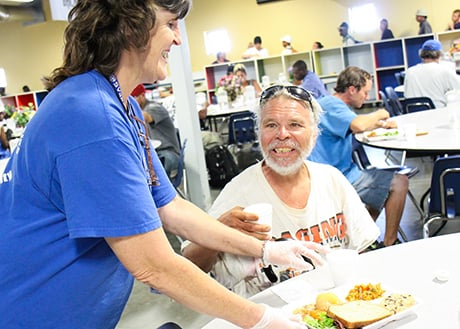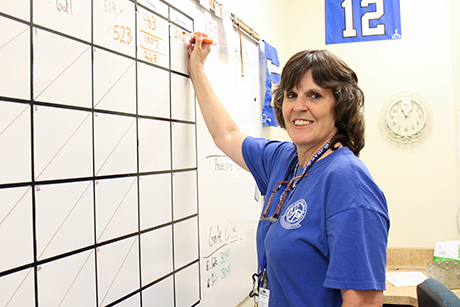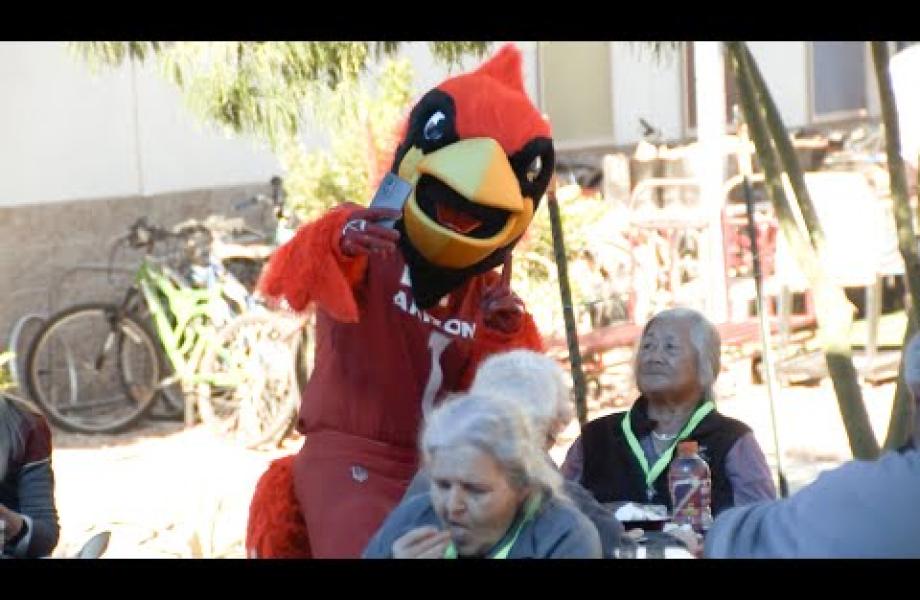Theresa's Story: Helping Others While Having Nothing
With a contagious energy, Theresa smiles often, laughs easily and is known by many. As dining room coordinator in St. Vincent de Paul’s downtown Phoenix dining room, she moves quickly and greets guests warmly as she makes her way through the crowd.
She stops at one table as a guest in a wheelchair pulls up. Theresa is quick to say hello, ask him how he’s doing and offers to retrieve a lunch tray for him. Joseph is mostly blind, but recognizes this familiar voice and smiles as Theresa dashes off to get his meal. Upon returning, she slows down to take the time and lead Joseph’s hand over the tray, explaining each food item. Then she shows him his cup of water, careful not to spill.

This is just one of many heartwarming interactions Theresa has each day with guests in our dining room. And for Theresa, this kind of connection is important.
She knows this because she herself was a guest in the dining room.
For many of her adult years Theresa struggled with a drug addiction, ultimately losing her home, children and everything she owned.
Theresa's parents divorced when she was a teen and by her early twenties, her father passed away. This loss greatly affected her. She was also devastated when her long-time high school sweetheart left her. By this time, she was a single mother of two, a daughter and a son. A few years later, she was set up on a blind date and she remembers the moment she met her now husband.
“He came over to fix the water pump on my car so I could visit my mother on Mother’s Day. I knew I liked him right away. Nine days later, we were married.”
Pretty soon after, her and her husband began using methamphetamine.
"Just for fun during weekends," she says, "but really, that was the beginning of the end."
For a long time they were both highly functioning users, she says. They held jobs and she continued to raise her children and take them to school. This went on for 16 years.
Eventually, the drug use started occurring more often and in higher quantities. That’s when things began to fall apart for Theresa. Both she and her husband lost their jobs and their home. Her children went to live with her mother full-time.
For the next several years, Theresa and her husband went back and forth between quitting and reusing drugs. For a time, Theresa lived with a friend in Nevada. Her and her husband entered a rehabilitation and recovery shelter twice. The first time, she recalls, their marriage went through a very rocky patch. They grew apart and Theresa moved to Washington for a few years for a fresh start. But she eventually came back and entered the shelter one more time to reconcile with her husband.
It was in November of 2008 that Theresa stopped using drugs for the last time. She received a ‘sobriety dove’ charm and wears it on a chain around her neck as a constant reminder of when she decided to change her life to live clean and sober.
Unfortunately, she still faced a long journey of gaining back the life she used to have. Her husband left the recovery shelter and without a place to live, went in search of a job. After graduating from the recovery program, Theresa soon followed suit.
At first she stayed with a friend, but quickly left, as she knew staying there might lead to her old lifestyle. For a long time, Theresa bounced around, from staying on friends’ couches, to checking into a shelter, and at worst times, lived on the street.
While homeless, Theresa slept on a piece cardboard every night across the street from SVdP’s dining room. And every day she went inside for breakfast and lunch.
“[I] felt defeated, like nobody cared,” she says. “I kept thinking, ‘I don’t want to be here or in this situation.’”
Emotionally, she had hit rock-bottom, constantly thinking about her mother, her children and wanting to be with her husband.
"I felt like I was disappointing everyone and I wanted my life back."
Because of her daily visits, Theresa had gotten know the SVdP staff in the dining room quite well. She shared with them about her struggles and one day the dining room coordinator asked Theresa if she would be interested in using her free time during the day to volunteer. After living so long without a job, Theresa wasn't sure if she would be able to handle being told what to do or for how long. So she started small, volunteering three days a week cleaning tables and picking up trash.
“Suddenly, three days a week wasn’t enough,” she said, laughing. “I loved it so much, I wanted to be there all the time.”
She loved knowing that she was giving back to "the place who had put a 'roof' over [her] head for so long." She felt encouraged every day, not only by the staff, but the guests as well, who were her friends while she was living on the street. She realized it was the first time in years that she felt empowered to learn new job skills and felt hope for her future in gaining and keeping a job.
"Volunteering here did wonders for my self-esteem and for the first time in a long time, I didn't feel worthless."

Eventually Theresa’s husband found a steady job and they both moved from the street into a low-budget extended-stay motel, paying week to week. And over the course of a year and a half, her initial schedule of three days a week, resulted in over 970 volunteer service hours.
SVdP dining room supervisor Bobby Plattner noticed her initiative.
“When we lost a staff member last year, I saw that Theresa really stepped up and started doing a lot the work he was doing,” says Bobby.
He recommended that Theresa apply for an open staff position. As of one month, ago Theresa became an official SVdP staff member. As dining room coordinator she coordinates volunteers, does inventory of food and other items, makes sure the laundry is done and ensures that the prep work is completed for the next day’s service.
She’s great at what she does, but for Theresa, the real joy in her work is the time spent with guests.
“She’s so good with our guests because she’s experienced with what they’re going through. They know her and trust her. Not to mention, she’s so energetic and positive. The volunteers really love that about her and love working with her,” Bobby says.
Theresa laughs and humbly shrugs her shoulders when she hears about the glowing reviews about her work.
“I’m just happy and I feel proud of where I am now. It’s taken a long time to get here and I enjoy giving back to the community.”



